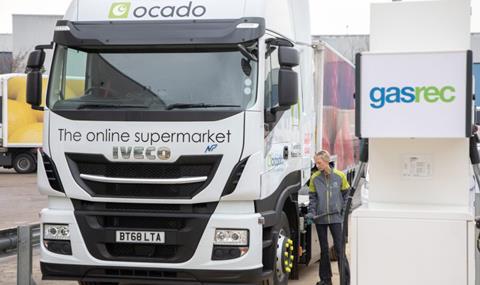
Online retailer Ocado has opened a new grid-connected compressed natural gas (CNG) refuelling facility as part of a wider £3m investment in gas technology across the fleet.
Sited at Ocado’s Hatfield customer fulfilment centre, it will be used to refuel 29 Iveco Stralis NP tractor units that joined the firm’s fleet last year.
The trucks, which represent 20% of Ocado’s 147-strong HGV fleet, will be fuelled using blended biomethane.
They are expected to reduce HGV fleet CO2 emissions by 29% each year compared with their diesel counterparts.
Read more:
- IVECO claims diesel to gas CO2 savings of 10% at debut of 6×2 Stralis NP truck
- How green are gas trucks?
- Waitrose and CNG Fuels underway with major dedicated gas truck trial
Ocado’s gas refuelling station has been designed and built by fuel supplier Gasrec. It can accommodate 80 vehicles in total, with Ocado looking to boost the fleet to 40 gas trucks this year.
The two businesses have agreed a 10-year support and maintenance contract, with Ocado also planning to expand its rollout of natural gas technology at future sites.
The investment in natural gas is part of Ocado’s wider strategy to explore and invest in carbon-friendly alternatives to diesel fuel. The retailer is also testing electric and hybrid delivery vehicles.
Graham Thomas, fleet services manager at Ocado, said: “By investing in gas-powered vehicles, and in our first on-site refuelling station, we’re future-proofing our fleet and our business.
“Emissions from CNG are cleaner than Euro-6 standards which start to take effect with the London Ultra Low Emission Zone from April, and will soon be followed by a further 32 clean air zones.”
James Westcott, chief commercial officer at Gasrec, said: “Ocado reacted immediately to the range of dedicated natural gas vehicles becoming available to HGV fleets and we’ve been able to design, build and commission the onsite refuelling infrastructure in time to meet the new trucks entering service.
“It’s fantastic to be working with a company so focused on improving the sustainability of its fleet – a move firmly backed by government, which has committed to supporting natural gas vehicles with a duty reduction until 2032.”













